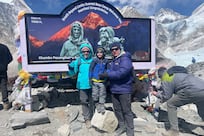DAMASCUS // The murder of the leading opposition figure Meshaal Tammo has ushered in a dangerous chapter in Syria's seven-month uprising, activists and analysts have warned.
Mr Tammo, assassinated by four gunmen on Friday, was the first well-known national opposition political figure to be killed since the revolt began in March.
"You cannot ignore that this is a message to the political opposition and possible future leaders," said Abdul Aziz Al Kheyr, a former political prisoner who is now helping to orchestrate a coalition of peaceful dissidents inside Syria.
"This is a very painful and dangerous development in the political struggle in this country," Mr Al Kheyr said, one that could "lead to more blood".
Mr Tammo's death may prove to be the spark that ignites Syria's approximately two million Kurds, who are politically well organised but who have, to date, had a restrained involvement in the uprising.
Mr Tammo was Kurdish.
Kurds dominate Syria's north-east but hundreds of thousands also live in Damascus and Aleppo, giving them a strong potential street presence.
"This is the first time we have had a political leader killed. We don't know who will be next," said Saleh Mohammad, head of the Kurdish PYD bloc. He said the murder was designed to bring an end to peaceful demonstrations and, instead, to ignite more violence.
"It's a very dangerous time now. We have to be very careful," he added.
Tens of thousands attended Mr Tammo's funeral in Qamishli yesterday, where they called for the overthrow of President Bashar Al Assad. In response, security forces opened fire with live ammunition, killing two people, according to human-rights groups.
No one has claimed responsibility for the assassination and, as with thousands of other deaths that have taken place since March, there has been no credible public investigation to determine the murderers. Since the uprising began, more than 2,900 people have been killed, according to the United Nations, including increasingly common street assassinations in protest hot spots.
As has become customary given the absence of facts, Syrians have been coming to their own conclusions based on their political outlooks. The authorities blamed an "armed terrorist group" while opposition activists accused Syria's secret police networks, saying only they would have the resources and motive to stage such an operation. Others blamed foreign intelligence agencies, which they insist want to see Syria plunge into a civil war.
"The regime is trying to clean the landscape of any political opposition that poses a real threat to it," said one dissident, speaking on condition of anonymity. "Meshaal was very active, he was liberal, he was a democrat and was uniting Syrians from all backgrounds and sects. He was one of the bright hopes for our future and for that reason he was killed."
Syrian state news agency Sana said four gunmen in a black car opened fire with automatic weapons on Mr Tammo, his son Marcel and a fellow political activist, Zahida Kilo, who had all been invited to lunch at a friend's house.
"The attack led to the martyring of Tammo immediately, while his son was injured with a gunshot to the abdomen and Kilo was shot in the foot," Sana reported. It referred to the slain activist as a "nationalistic opposition figure" and stressed he had rejected calls for foreign military intervention in Syria.
Other accounts of his death differed, with some opposition activists saying he was killed inside his home.
Mr Tammo, 53, had only recently been released after serving a three-year jail term for his political activism.
As the leader of the Kurdish Future Movement, he had played a major role in bringing together old guard opposition figures with the new generation of street protesters, while also forging links between those groups and the exiled opposition.
He was part of the Syrian National Council (SNC), a coalition of opposition figures that includes the Muslim Brotherhood, the Local Coordination Committees of street protesters and secular dissidents. The SNC is often accused by supporters of Mr Al Assad of backing an armed insurgency inside Syria. One of the initiatives Mr Tammo had spearheaded was a groundbreaking opposition meeting in the Damascus protest neighbourhood of Qaboun in July. It was cancelled at the last minute when, according to activists and local residents, 16 people were killed outside the venue by security forces.
It would have been the first time street protesters, exiled dissidents and experienced political activists had met openly.
Mr Tammo had been an implacable critic of the Syrian regime and cheerfully optimistic that the uprising would eventually succeed in toppling it. His vision for a future Syria was based on secular democracy, rotation of power, rule of law and equality between citizens.
He had little time for narrow Kurdish identity politics, insisting that democracy and civil rights would answer the "Kurdish question" and protect minority groups.
That stance had put him sharply at odds with other powerful Kurdish parties, which insist on Kurdish ethnic rights - rather than the same basic rights for all Syrians - being guaranteed specifically in any future state.
The United States and the European Union condemned the murder of Mr Tammo, with Washington calling it a "clear escalation of regime tactics".
"This is a new chapter for Syria. The situation is getting darker all the time," said an independent Syrian political analyst in Damascus, who spoke on condition of anonymity. He brushed aside suggestions anyone other than pro-regime groups were behind the murder.
"What I am not sure about is whether it is a signal that the regime is weak and afraid, or just that the hardliners are now more in control than ever," he said.




